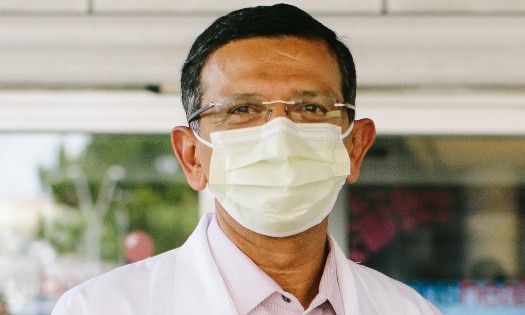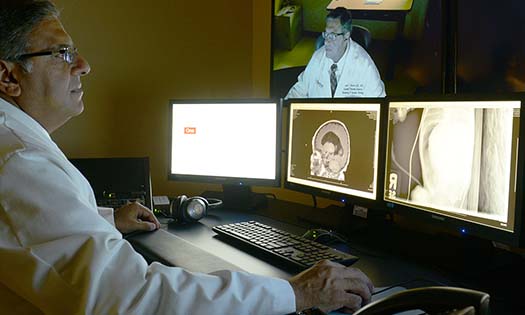The Innovation: A ‘Medical Home’ for Pediatric Long COVID Patients
A growing number of children and teens are experiencing long COVID: a collection of symptoms – including fatigue, headache and shortness of breath – that persist for more than 12 weeks after COVID-19 infection. But many providers are unsure what pediatric long COVID looks like, how to evaluate for it and what treatments to pursue. That's why Children's Health℠ recently launched one of the nation's first long COVID clinics for children and teens.
The Pediatric Post-COVID-19 Respiratory Care Clinic offers comprehensive respiratory function testing, physical therapy and personalized treatment plans.
“One of the first things I tell our patients is, ‘You’re in the right place, your symptoms are real, we have many children who are going through the same thing and there is light at the end of the tunnel’,” says Kubra Bozkanat, M.D., Pediatric Pulmonologist at Children’s Health and Assistant Professor at UT Southwestern.
The Big Picture: What Long COVID Looks Like in Children
Data varies on the prevalence of long COVID in children, but a recent study including 1,884 children reported that about 5.8% children have long COVID symptoms after 90 days.
Dr. Bozkanat saw a significant increase in pediatric COVID patients when the Delta variant surged in September 2021. Some had to go home with supplemental oxygen even after they recovered from acute infection. That's when she decided to create the new clinic, to follow the long-term respiratory health of children with severe COVID-19 illness. The clinic is the only one of its kind in North Texas and is housed at Children's Medical Center Dallas, part of Children's Health.
The clinic also sees many children and teens who have persistent respiratory symptoms even though they had only minor, or even asymptomatic, COVID-19 infections.
Many patients are athletes between the ages of 11 and 18, who are seemingly healthy but no longer active in sports like they had been before COVID infection. Dr. Bozkanat thinks that these patients and their families are more likely to notice the toll that long COVID takes on their energy and endurance.
“Unfortunately I feel like the teenagers’ symptoms are being dismissed by health care providers,” Dr. Bozkanat says. “But when we actually have them walk, have them exercise, we see that a lot of these children are unable to play sports and that's such a big change in their lives.”
The clinic focuses on respiratory symptoms of long COVID, such as low blood-oxygen levels, shortness of breath and new or worsening asthma, as well as mental health issues like anxiety and depression. But similar to adults, children and teens can experience a wide range of symptoms. These include fatigue, headache, stomach pain, nausea and anemia. For these patients, the clinic makes referrals to other specialists at Children’s Health and UT Southwestern.
Key Details: How Individualized Treatment Improves Outcomes
Patients are being referred to the clinic by primary care providers across Dallas-Fort Worth. In some cases, they find their way to the clinic without a referral because parents, desperate for help, learn about it on their own.
Dr. Bozkanat recommends that primary care providers who are deciding whether to refer patients first conduct a thorough physical exam and medical history to find out whether symptoms began or got worse after COVID infection. Additionally, it can be helpful to obtain a chest X-ray for patients who have shortness of breath, to rule out other causes such as secondary infection. An electrocardiogram (EKG) can also be appropriate for patients who have chest pain and/or may warrant referral to a cardiologist.
During a patient’s first visit, Dr. Bozkanat or one of her colleagues, such as Aarti Shakkotai, M.D., Pediatric Pulmonologist at Children’s Health and Assistant Professor at UT Southwestern, perform a series of pulmonary function tests, such as the six-minute walk test. These tests identify whether patients have low blood oxygen levels or an abnormal heart rate increase, potentially serious conditions that the clinic has found to be common. These conditions can require chest imaging and evaluation by a pediatric cardiologist. The pulmonary function tests can also detect airway reactivity or asthma.
“A lot of what the clinic provides is related to testing and trying to figure out what exactly is going on with the patient,” Dr. Bozkanat says. “I don’t know of many primary care providers that have those testing capabilities.”
Treatment can range from sending children home with supplemental oxygen to following up in a couple months to see if mild cases improve on their own. Dr. Bozkanat and her colleagues also prescribe inhaled bronchodilators and corticosteroids if children have airway reactivity. Some physicians have been considering whether inhaled therapy can help all children with long COVID, but Dr. Bozkanat has found that it has little benefit for children who do not have asthmatic symptoms.
Physical therapy is also essential. Every patient sees the clinic’s physical therapist, Renallie Arcinas, P.T., D.P.T., who specializes in respiratory disease and pulmonary rehabilitation. She evaluates patients and gives them a personalized exercise plan.
The clinic also gives patients the option of meeting with the on-site psychologist, Juliana Alba-Suarez, Ph.D., either in-person or virtually. Dr. Suarez is a Pediatric Psychologist at Children’s Health and Assistant Professor at UT Southwestern. During meetings, Dr. Suarez teaches relaxation and distraction strategies and normalizes the stressfulness of having a chronic illness.
“My goal is to improve patients’ overall functioning, not just from a mental health perspective, but help them cope with their diagnosis so they can do what they need to do to improve their physical functioning,” she says.
Most patients at the clinic recover or experience symptom improvement after six to nine months.
Why Children’s Health: Leading Research to Improve Long COVID Treatment
Dr. Bozkanat and her colleagues are analyzing the data they’ve collected since starting the clinic. So far, they’ve found that many pediatric long COVID patients report shortness of breath and headache, similar to what other studies have reported. The physicians are planning to study whether long COVID is more common or presents differently in females and males who visit the clinic, and in children who have not been vaccinated.
Dr. Bozkanat is also collaborating with Sarah Messiah, Ph.D., M.P.H., Professor of Epidemiology, Human Genetics and Environmental Sciences at the University of Texas Health Science Center, to determine the trajectory of lung function recovery among children who were hospitalized because of COVID-19.
“We’re trying to understand if there is any other way that we can help them get better faster,” Dr. Bozkanat says. And by writing journal articles and talking with colleagues, she says, “we are trying our best to educate physicians in the community to identify these symptoms and refer appropriately.”
To refer a patient to the clinic, please call 214-456-2857.
Learn more about the innovative pulmonology care and research at Children’s Health >>


